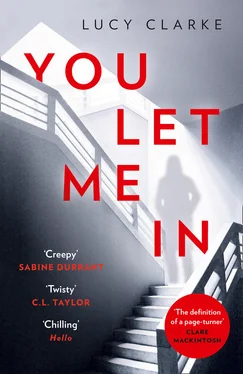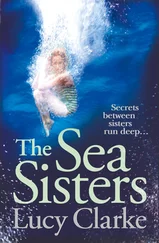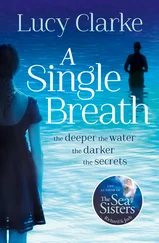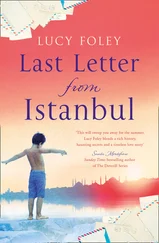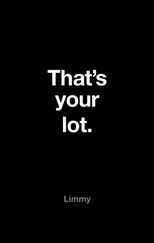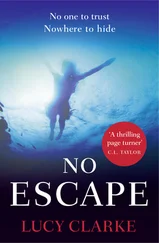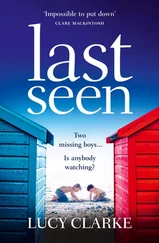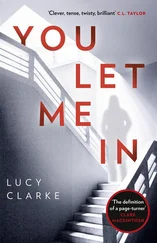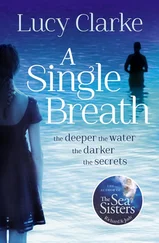1 ...7 8 9 11 12 13 ...18 I tread water, blinking saltwater from my eyes, looking again. It is a trick of the light, of course. A strange reflection, because now the shadow has gone.
*
The first time I saw the cliff-top house was with Flynn. We had come to Cornwall to be introduced to a ten-day-old Drake. Fiona seemed shell-shocked that this tiny pink creature with tightly curled fists and a fierce cry was hers. She moved around the house in a daze, a muslin flung over her shoulder, patches of her shirt stiff with leaked milk.
‘Take him,’ Fiona had begged, when I passed the nursery one evening and found her jigging him wearily.
Pressing him to my chest, I slowly circled my palm over the curve of his tiny back. I began to sing in a low, half-whispered voice, words that unravelled from some distant song that our mother had taught us. The rhythm seemed to soothe him, and I placed my lips against the soft down of his head and breathed in. Longing bloomed like blood rising to the surface of my skin.
When I turned, I saw Fiona still standing in the doorway of the nursery, watching. Her eyes shone with tears that didn’t fall.
‘I can’t even stop him crying.’
‘You’re doing brilliantly – but you’re exhausted. Get some sleep. I’ll wake you when he’s hungry.’
Fiona didn’t seem to hear. Her gaze was on the empty cot.
‘There are so many things I want to ask Mum. She did it on her own. The two of us.’ She shook her head. ‘Dad left when you were six weeks old. How the hell did she manage with two kids and no family nearby to help? I can’t even imagine. She was a hero, but I didn’t … I didn’t tell her how incredible she was … it’s only now …’ She pulled back her lips, as if baring her teeth. ‘I just, I miss her so much.’
‘I know you do,’ I whispered.
It was no surprise that the cruelness of our mother’s absence revisited us again with the birth of Drake, in the way that life and death circle each other. She would have loved rocking Drake to sleep in her arms, examining those tiny pink toes, carefully dressing and undressing him, bathing him, washing the blankets he used, the Babygros he soiled, the muslins he posseted on. She would have made meals, stocked freezers, emptied bins, folded washing. She would have praised Bill’s easy competency at changing nappies, or with manning the sterilizing station. She would have looked at Fiona and known that sleep deprivation was sinking her, that the baby blues were in danger of growing into something more serious.
She would have done all those things because she was a mother herself, and she knew.
I tried to fill that role as best I could, but each time I held Drake, my own longing sharpened. Flynn, sensing I needed a break, removed the pile of clean vests and white hats and delicate cardigans I’d been folding, took my fingers in his and told me, ‘Let’s walk.’
We weaved down a footpath in the direction of the coast, eventually coming to a steep path of switchbacks leading to a small bay hugged by cliffs.
I had a vague memory of visiting this beach years before. I could recall the red tassels of a picnic blanket, my mother sitting with a hand shading the sun from her eyes, marvelling at something. I could picture the black rocks that lay exposed and dripping at low tide.
As we walked, Flynn said, ‘It will happen for us.’
I’d slipped my hand into the back pocket of his jeans, leaning into him. ‘It’s been over a year.’
‘Maybe it’s time to see a doctor.’
I felt myself stiffen, retract. But I needed answers, too.
When we reached the far end of the bay, we looked up, noticing the squat fisherman’s cottage set on the cliff top. ‘What a view.’
‘It has a For Sale sign,’ he said, pointing to the red board at its shoulder.
The owner was home – a retired nurse who didn’t mind this young couple knocking on her door – and she invited us to look around. The cottage was hopelessly run-down, the roof sagging, the wallpaper curling at the edges, yet there was magic there.
‘Imagine living here,’ Flynn had said when we were alone, turning me to face the view, wrapping his arms around my waist, chin resting on my shoulder. ‘We could do it, couldn’t we?’
The money from my advance had just landed in our account, and Flynn had some savings from a family inheritance.
‘Yes, I think we could. But Cornwall? What about your job?’
‘I can be a tree surgeon anywhere,’ he’d said. ‘I think this is where you want to be, isn’t it? Near your sister, near Drake.’
I thought of Fiona cradling her new son; I thought of our mother’s dream to own a house overlooking the sea; I thought of the chances of stumbling across this cottage, finding the owner home. It seemed serendipitous.
‘Yes,’ I’d said to Flynn. ‘It is.’
Twelve weeks later, we had the keys. We moved in, sleeping on a mattress on the floor while we made plans. A lick of paint. A wood burning stove. New curtains. Fresh carpet. It was everything we’d need.
Now, as I swim looking up at the towering house on the cliff top, I wonder if we’d stuck to the plan – if the idea of the house hadn’t overtaken me – whether our marriage would have had a better chance of surviving.
Here I am alone, with a house I can no longer afford, and a career that feels like it, too, is teetering on a cliff edge.
My feet look bloodless and pale against the dark rock as I climb the cliff steps, shivering beneath my dressing gown. My hair hangs wetly at my neck and I am already anticipating the warmth of the shower.
As I follow the narrow path alongside the house, a plastic bag wheels past on the breeze, brushing my bare ankle. I grab for it, but a gust lifts it out of reach, parachuting the bag beyond me. Hurrying after it, I come to the end of the path and halt.
The driveway is scattered with litter. Used kitchen roll, empty tins, plastic containers, and cereal boxes are strewn across the gravel. Sheets of newspaper dance in the gusts, several more pinned against the fence line. A crumpled page from a notebook rolls past me. At the edge of the driveway, the recycling bin lies on its side, lid open. Although the wind is blowing, I know it isn’t nearly strong enough to upturn a bin.
I hurry across the drive, gravel cutting into my feet, and with some effort, I manage to right the bin. I re-knot the belt of my dressing gown, then begin gathering the litter. My wet hair whips around my face, leaving trails of fresh salt.
As I push my hair back from my face, I have the growing sensation that I’m not alone.
Across the lane, I spot Mark standing in the doorway of his parents’ house, a cigarette held between his fingers.
‘Foxes,’ he calls.
He stubs the cigarette against the wall, then turns and disappears inside the house.
I stand there, open-mouthed. Did that just happen? Had he – a grown man – upturned my bins?
I half-laugh, staggered. Is this a reaction to the house build – a retaliation for compromising the view from their family home? I think of the awful visit six months after we’d bought the house, as I unrolled the architect’s drawings across Frank and Enid’s kitchen table.
‘You said renovate, not rebuild!’ Frank exploded, colour bursting into his cheeks.
When I’d worried about the neighbours’ reaction, friends reassured me that No one owns a view! Any other buyer would do the same! Although they were right, it didn’t lessen the guilty heat that crept up my neck.
Enid had moved towards the kitchen window, heavy-knuckled hands worrying the edge of her cardigan. She looked out towards the sea as if her time with the view was waning. If there’d been a moment when I was close to reconsidering, that had been it.
Читать дальше
